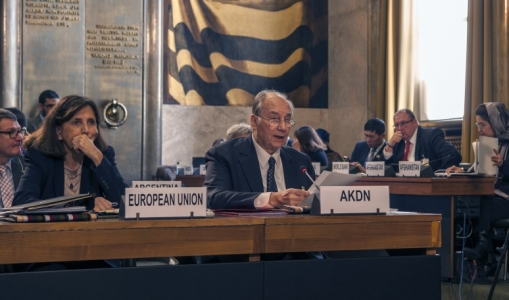Speech by His Highness Geneva Ministerial Conference on Afghanistan 2018-11-28
Bismillah-ir-Rahman-ir-Rahim
Excellencies,
Ladies and Gentlemen,
I wish to thank the Government of Afghanistan and the United Nations for bringing the international community together to reaffirm our commitment to Afghanistan, and, most importantly, to its people.
Two years ago, many of us gathered in Brussels for a similar purpose. And there have been several such gatherings over the past some seventeen years. Commitments have been made, challenges overcome, hopes raised and sometimes dashed.
It would seem at times that hope is difficult to sustain. The challenges of building security, alleviating poverty, addressing the impact of climate change, and the complexities of pursuing reconciliation are a few of the cross-cutting areas that dominate our thinking.
I would suggest that we should be guided equally by acknowledging and supporting the resilience of the Afghan people.
They have recently voted in record numbers, often at great personal risk. And their spontaneous reactions during this year’s brief ceasefire gave us all a glimpse of the country that could be: people from every region and background unified in their desire for peace.
The National Unity Government also deserves our recognition and support for its efforts to implement critical reforms and advance Afghanistan on the road to self-reliance.
Two years ago, in Brussels, we promised to deepen our commitment in three critical areas: building human capital; strengthening institutions and civil society; and promoting regional development.
I have always maintained that my institutions would make a permanent commitment to the country. Therefore, on behalf of the Ismaili Imamat and the Aga Khan Development Network, I underline, once again, our enduring commitment to Afghanistan and to its peoples.
As we come together to support the National Unity Government, investing in civil society - encouraging private organisations designed to serve public goals - deserves equal attention. Such institutions can be stabilising factors and points of continuity. That is why AKDN supports the full spectrum of civil society, devoting special attention to health, education, culture, community governance, and public-private partnerships to deliver other services.
Therefore, since our last meeting, working in cooperation with our partners, we have opened the Bamyan Provincial Hospital, and the Mothers’ Wing of the French Medical Institute for Mothers and Children in Kabul. We have expanded our work with Afghanistan’s education system to improve the quality of learning and to help over 150,000 girls to go to school. In the coming years, we intend to build a full-service tertiary research hospital in Kabul linked to the Aga Khan University, to deepen our work in primary and secondary education, and to expand activities of the regional University of Central Asia.
In the area of civil society, our ongoing commitment to Afghanistan’s diverse culture was marked by the recently-completed Chihilsitoon Palace and Gardens, joining over 140 other heritage sites around the country restored by the Aga Khan Trust for Culture with the strong support of the Afghan government and international partners. This year, we have together launched an ambitious plan to rejuvenate the Kabul Riverfront. We are also working directly to harness the power of people coming together: through the Aga Khan Foundation, we have helped thousands of community groups and district authorities deliver the government’s vital Citizen’s Charter and promote more inclusive development in remote areas.
To foster regional integration, we have expanded the transmission lines of Pamir Energy from Tajikistan into Northern Afghanistan, providing some villages with power for the first time. We will soon start work on a sixth cross-border bridge and market between those countries, and are in advanced discussions to increase substantially electrification from the border to Faizabad.
Mr Chairman, the experience of the past seventeen years has strongly reinforced my conviction that the path to sustainable peace in Afghanistan depends heavily on two key principles – regional cooperation, which is key for national development and stability; and a commitment to pluralism – the country’s diversity must be cultivated as a source of strength. Everyone in all regions should benefit from investment that creates hope for the future. This is a guiding principle of our investment in Afghanistan. I hope that these are principles on which we can all work together, and to which we remain committed in Afghanistan.
Thank you.
- 5341 reads
 Ismaili.NET - Heritage F.I.E.L.D.
Ismaili.NET - Heritage F.I.E.L.D.